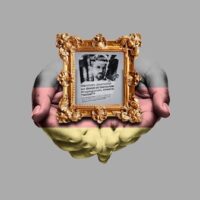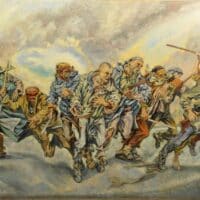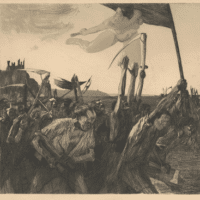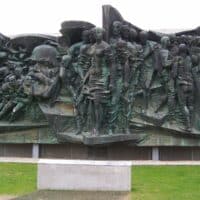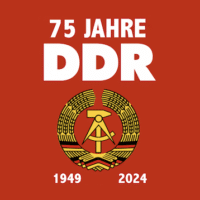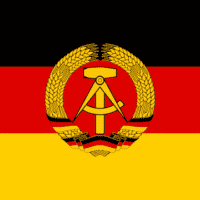-
Cartoonists can compare victims of genocide to Nazis—but not the perpetrators
Cartoonist Mr. Fish (real name Dwayne Booth) posted an update to his Patreon on March 20 headed “Fish: Laid Off!”
-
Political Renewals: Berlin Bulletin No. 234, May 19, 2025
Germany, long a synonym for economic brawn and muscle, is beginning to recall words like lumbago or sciatica instead. Though still leading in Europe, and fourth in the world, it faces an economic mess, a political mess, and a mood of general stress. Schools lack repairs and teachers, clinics and hospitals lack staff, its key […]
-
Obliterating the truth about Nazi defeat
NAZI Germany was basically defeated by the Soviet Union. The sacrifice made by the Soviet people in defence of their country in that war was utterly unimaginable.
-
The real Trump revealed
On Friday, the United States granted approval for Germany to transfer 125 long-range artillery rockets and 100 Patriot air-defense missiles to Ukraine, a congressional official confirmed to The New York Times.
-
Facing prison time in Germany for criticizing an Israeli journalist: The case of Hüseyin Dogru
In December, Potter, a self-styled counter-extremism expert, published a lengthy exposé in The Jerusalem Post, claiming that red. media, MintPress News, and The Grayzone were part of a network of far-left outlets promoting extremism and anti-Semitic conspiracy theories.
-
The Buchenwald concentration camp was liberated by Communist prisoners: The Fifteenth Newsletter (2025)
Eight decades ago, communist prisoners organised and liberated the Nazi concentration camp Buchenwald, where they were held. As the far right of a special type rises across Europe, these heroic victories of anti-fascist resistance are under attack.
-
16th century revolutionary’s words resonate today: Review of new book on Thomas Muntzer
Andrew Drummond’s marvellous new book, The Dreadful History and Judgement of God on Thomas Muntzer: The life and times of an early German Revolutionary, published by Verso, is “the definitive” biography of the sixteenth century revolutionary, in the words of one Marxist historian.
-
The Oval Room, Kyiv and the Kremlin: Berlin Bulletin No. 232, March 14, 2025
Some world events can look different to those of us onthis side of the Atlantic, also, more precisely, in Berlin. God knows, here too I’m frightened at what Trump, Vance and Musk are doing and planning. Nor do I love Putin. But what I hate above all else is war—and is closer over here. I’m […]
-
The roots of neo-fascism in East Germany
The fall of the Berlin Wall enabled neo-fascist activity to spill over into East Germany, laying the groundwork for the strengthening of right-wing forces today.
-
Neofascism in the White House
In this republished essay from 2017, John Bellamy Foster discusses how U.S. neofascism in certain ways resembles the classical fascism of Italy and Germany in the 1920s and ’30s, but with historically distinct features specific to the political economy and culture of the United States in the opening decades of the twenty-first century.
-
German politicians criticize Musk backing for far-right AfD
After Elon Musk posted his support for Germany’s far-right AfD, the party’s leader Alice Weidel expressed her gratitude. Other German lawmakers have criticized “interference” in the country’s upcoming federal elections.
-
Looking backward autobiographically
I’m old enough to remember, just barely, the Great Depression: lines of shabby men waiting for free soup, better-dressed men selling apples on streetcorners, miles of evil-smelling, self-made shacks in a Hooverville near Newark.… In February 1937 I recall the movie newsreel with happy, unshaven sit-down strikers at GM in Flint, waving from the factory windows in a dramatic (Communist-led) victory which changed the USA.
-
Nursery rhymes and politics: Berlin Bulletin No. 229, November 16, 2024
Billions were spent both on aid to the Zelensky government…as an urgent defense necessity to counter “the Russian threat.” This threat has appeared and reappeared in Germany in 1914, the 1930s, after 1945 and now again, louder than ever, with similar barked Prussian commands: “Achtung! Die Russen kommen!” as dangerously false as ever, and often followed by eastward expansion, invasion and, far too often, catastrophe, with atomic annihilation an added danger this time around.
-
Boots and Boosts: Berlin Bulletin No. 228, November 28, 2024
While so many in the world hold their breath for Harris or Trump it would also be wise to keep an eye on Germany. A sharp eye!
-
Teetering and tears: Berlin Bulletin No. 227, October 11, 2024
Despite all the many years, those who hated the GDR still hate it today. Indeed, they seem to fear it, and continue almost daily to revile its memories—like kicking an old horse cadaver which might yet bite or strike out with a hoof or two.
-
GDR at 75: The German Democratic Republic was a milestone in the world revolutionary process
The German Democratic Republic was a milestone in the world revolutionary process.
-
Peace was paramount
The state doctrine of the GDR was: “Never again must a war start from German soil.”
-
Disgusted voters: Berlin Bulletin No. 226, September 24, 2024
Most worried of all are the people in eastern Germany, the one-time German Democratic Republic founded so hopefully almost exactly 75 years ago, October 7, 1949, and buried—triumphantly for a large number—41 years later, on October 3, 1990.
-
Wolfgang Streeck: “Sahra Wagenknecht is the only one asking the right questions—and offering the right answers”
The famous German sociologist discusses the recent elections in eastern Germany, the need to return to the nation-state, left-wing communitarianism, and the shortfalls of right-populism.
-
East German election trimmings: Berlin Bulletin No. 225, September 5, 2024
Is the AfD a fascist party? Björn Höcke, its boss in Thuringia, one of its three best-known national leaders and its main rabble-rouser, has never concealed his admiration for Germany’s days of swastika glory.





